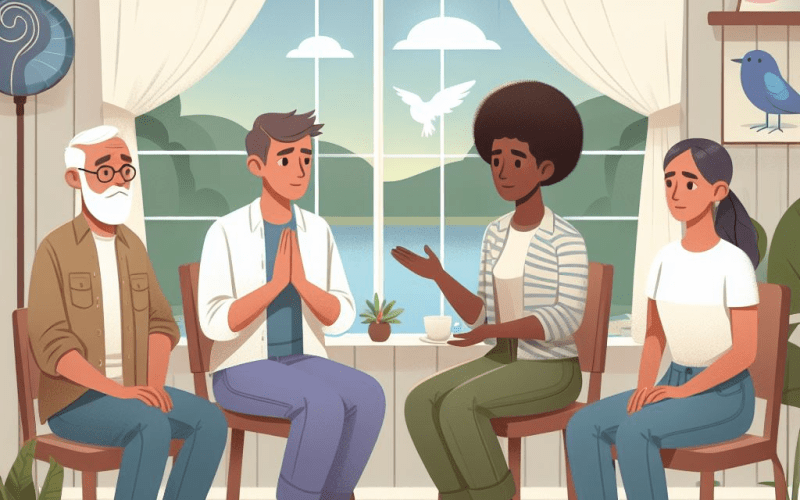Introduction
Hi there! I’m Sarah, a family therapist with over 15 years of experience helping families navigate communication challenges. I’ve seen firsthand how unresolved conflict can strain relationships and create a toxic environment, especially for children. But there is hope! Today, I want to share a powerful tool that can help your family move from yelling to talking – mediation.
Headings
- The Toll of Unhealthy Communication
- What is Mediation and How Does it Work?
- Benefits of Mediation for Families
- Fostering Open Communication
- Finding Common Ground
- Tailored Solutions
- Cost-Effective and Time-Saving
- Is Mediation Right for Your Family?
- Finding a Qualified Mediator
- The Power of Communication in Healing Your Family
The Toll of Unhealthy Communication
Constant yelling, arguing, and criticism can take a significant toll on families. Children exposed to such negativity may experience anxiety, depression, and difficulty forming healthy relationships in the future. For adults, the stress can manifest in physical health problems, decreased work productivity, and strained emotional well-being.
What is Mediation and How Does it Work?
Mediation is a structured process where a neutral third party helps families resolve conflict. The mediator doesn’t take sides or make decisions; their role is to facilitate communication, identify underlying issues, and guide the family towards a mutually agreeable solution. Here’s a simplified breakdown of the process:
- Intake Session: The mediator meets with all parties involved to understand the situation and set expectations.
- Joint Sessions: The mediator facilitates open communication, allowing each person to express their feelings and needs.
- Brainstorming Solutions: The mediator guides the family in exploring options and finding common ground.
- Reaching an Agreement: If a solution is reached, the mediator helps document it in a formal agreement.

Benefits of Mediation for Families
Mediation offers numerous advantages for families struggling with communication issues:
- Fostering Open Communication: The mediator creates a safe space for honest and respectful dialogue, allowing each family member to be heard.
- Finding Common Ground: By focusing on underlying needs and interests instead of entrenched positions, mediation helps families discover areas of agreement they may not have seen before.
- Tailored Solutions: Unlike court rulings, mediation solutions are not one-size-fits-all. Families can craft agreements that meet their unique circumstances and priorities.
- Cost-Effective and Time-Saving: Mediation is typically much less expensive and time-consuming than litigation, making it a more accessible option for a wider range of families.
Table: Benefits of Mediation vs. Litigation
| Feature | Mediation | Litigation |
|---|---|---|
| Cost | Less expensive | More expensive |
| Time | Faster resolution | Can be lengthy |
| Focus | Collaborative problem-solving | Adversarial process |
| Outcome | Tailored agreements | Judge-imposed decisions |
Is Mediation Right for Your Family?
Mediation isn’t a magic solution for every situation. However, it can be a powerful tool for families committed to working together to find a peaceful resolution. If you’re open to communication and willing to compromise, consider these factors:
- The nature of the conflict: Mediation is most effective for issues like child custody arrangements, visitation schedules, and financial division during divorce.
- The level of hostility: While some tension is normal, mediation isn’t suitable for situations with a history of violence or abuse.
Finding a Qualified Mediator
Look for a mediator with experience in family law and a good understanding of family dynamics. Many local courts and bar associations maintain lists of qualified mediators. Don’t hesitate to interview potential mediators to find one who feels like a good fit for your family.
The Power of Communication in Healing Your Family
Mediation can be a transformative experience for families. By learning to communicate openly and respectfully, you can not only resolve immediate conflicts but also create a foundation for healthier relationships in the future.
Remember, even the strongest families can struggle with communication. Don’t be afraid to seek help. With the guidance of a skilled mediator, you can move from yelling to talking and rebuild a loving, supportive family environment.
Additional Resources
This article has hopefully provided a glimpse into how mediation can empower families to overcome communication hurdles. Here are some additional resources that you may find helpful:
- The American Bar Association (ABA) Family Law Section: https://www.americanbar.org/groups/family_law/
- The Association for Family and Conciliation Courts (AFCC): https://www.afccnet.org/
- National Council on Family Relations (NCFR): https://www.ncfr.org/
Final Thoughts
Remember, communication is a skill that takes practice. Even after successful mediation, there may be times when communication breaks down again. Don’t get discouraged! Use the tools you learned in mediation to keep the conversation going. Here are some tips:
- Practice active listening: Pay attention to what the other person is saying, both verbally and nonverbally.
- Use “I” statements: Instead of accusatory language, express your feelings and needs in a way that the other person can hear.
- Be respectful of differences: It’s okay not to agree on everything, but you can still have a healthy relationship.
- Seek professional support if needed: If you continue to struggle to communicate effectively, consider individual or family therapy.
With a commitment to open communication and a willingness to work together, your family can overcome conflict and build a more peaceful and fulfilling future.












